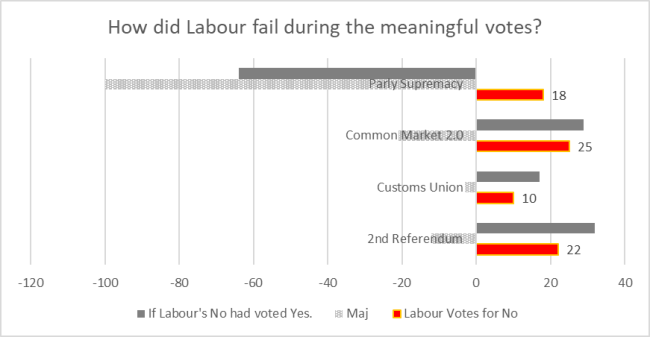Owen Jones obviously felt the need to project himself into the stickiest mess that he could in the Labour Party. Well, the second stickiest mess actually. He published an article, Hard remainers wouldn’t accept a soft Brexit. Now we’re all paying the price, in the Guardian. It was subtitled, “Anything other than stopping Brexit was written off as both disastrous for the country and morally untenable”. His article has been picked up the usual culprit’s outriders allowing them to revisit their story of “Remainer Betrayal”. There’s just one problem with this story, it’s complete bollocks!
Jones summarised part of the story well,
Both the intransigence of prominent leavers and the refusal of leading remainers to accept a compromise succeeded in polarising the electorate. By the European elections, Labour was out of any good options, and Corbyn and his key parliamentary allies believed there was no choice but to back a new referendum. They were right: the Labour membership wanted one, and Corbyn’s political project was founded on accepting they were sovereign, and remain voters had defected en masse to the Liberal Democrats and Greens. The remain movement had succeeded in its aim – forcing the Labour party to accept its central demand – but at a huge cost to Corbyn: the leader was left looking like an unprincipled zigzagger, contributing to the collapse in his personal ratings. Labour lost the election partly because of the errors of its leaders; but those prominent remainers share a considerable amount of the blame.
Owen Jones, the Guardian (Hyperlinks are theirs)
I am not sure that he represents the causality correctly in his first sentence, I’d argue the absolute refusal of leavers to countenance a final say referendum, dating from May’s “Brexit means Brexit” speech pushed remainers to a harder position, though I can’t see why I shouldn’t have asked for a final say since the referendum’s Leave vote encompassed everyone from those who wanted a Norway style deal through to those that wanted us to become the 51st state. Jones and others also conveniently ignores the proven criminality of the Vote Leave campaign.
Before blaming Labour’s remainers, we should look at how the PLP’s leavers torpedoed three of the meaningful vote options, inc. a 2nd referendum. There was no deal on the table from May, even when Labour dropped its six tests for the new red lines; the Tory Govt., would not or could not come to an agreement. Jones’ and others’ idea that Labour should have agreed with May’s deal was not possible and is as likely to have caused today’s problems to the Good Friday Agreement.
The road to the general election of 2019 was also set by the supporters of Labour’s “general election first” policy i.e. before a final say referendum and from where I am standing this reflected a remain/leave split, Labour’s leavers, ignoring the weight of the member’s views and that of our voters used every tool they had to win their ‘Lexit’ position; for them soft-brexit and 2nd referendum weren’t good enough, partly because they feared the result of the latter. Also hugely to blame was the unprincipled behaviour of the LibDems and SNP in permitting the election before parliament had closed out a no-deal option, and in the case of the LibDems, their ludicrous grandstanding on Brexit.
While the country moved away from a soft-brexit, and polarised to where it was last year, it wasn’t Labour’s Remainers who were primarily at fault. Our committed leavers gave others permission to vote Tory and the state of their parties was and remains a disgrace. …











